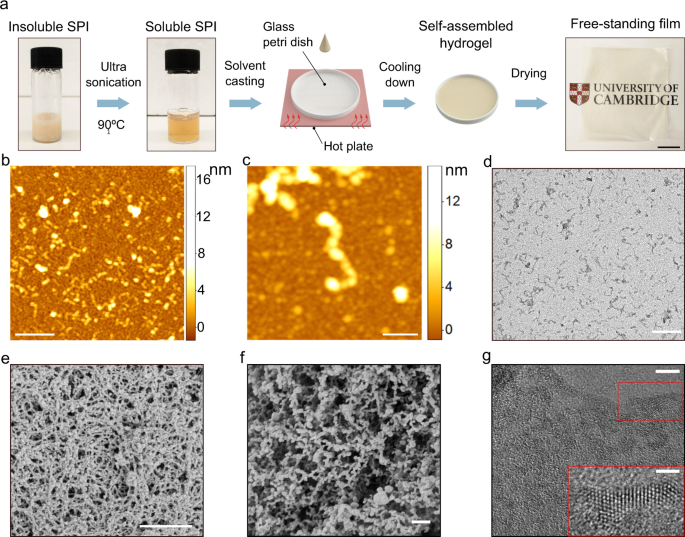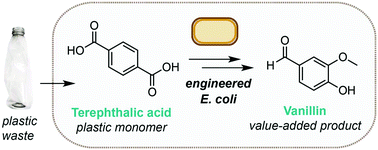(‘Vegan spider silk’ provides sustainable alternative to single-use plastics)
2021-06-10 英国・ケンブリッジ大学

・ ケンブリッジ大学が、植物タンパク質による自立性ポリマーフィルムを開発。
・ 同フィルムは、現行のプラスチックと同等の強度を提供し、多様な日用品に使用されているプラスチックの代替が期待できる。産業用コンポスト施設での分解が必要なタイプのバイオプラスチックと異なり、構成要素の化学的な修飾が不要なため家庭でのコンポスト処理で安全に分解する。
・ アルツハイマー病等の疾病とタンパク質のミスフォールドの関係性を研究する過程で、スパイダーシルクのような分子結合力が弱くとも高強度の材料に注目。水素結合の超高密度で規則的な配置がその要因の一つであることを発見。このような規則的な自己集合を他のタンパク質で制御・再現する方法を探った。
・ 食品産業の副産物として持続可能かつ豊富に調達可能な植物のタンパク質に着目。大豆油生産の副産物として入手し易い大豆タンパク質分離物(SPI)を利用し、自己集合を制御してスパイダーシルク構造を再現した。
・ 豊富に存在する天然のポリマーのポリサッカロイドであるセルロースやナノセルロースは、プラスチックの代替として多様なアプリケーションで使用されているが、 強力な材料を作るには架橋処理が必要。タンパク質では化学修飾無く自己集合によりシルクのような強力な材料を形成できるが、取り扱いが難しい。
・ SPI の水溶性の乏しさにより、規則的な構造への自己集合が困難であるため、酢酸と水の混合溶媒、超音波処理および高温度を組合せたプロセスで SPI の水溶性を向上させ、水素結合の形成により分子間の相互作用が強化されたタンパク質構造を作製。溶媒を除去すると、非水溶性のフィルムが得られる。
・ 低密度のポリエチレンのような高性能プラスチックに匹敵する同フィルムの強度は、ポリペプチド鎖の規則的な配列によるもの。バイオポリマーフィルムの性能向上に不可欠な化学薬品による架橋が不要。
・ 同大学のスピンアウトの Xampla 社が、食洗機用タブレット型洗剤や洗剤カプセル等の日用品に使用されるプラスチックを代替する、シングルユースの小袋やカプセル等の製品を年内に販売する予定。
・ 同社は、Cambridge Enterprise を通じて同新技術の特許を取得済み。リードインベスターの Cambridge
Enterprise と Amadeus Capital Partners、および Sky Ocean Ventures とケンブリッジ大学 Enterprise
FundⅥ(Parkwalk が管理)より、2 百万ポンドのシードファンディングを調達した。
URL: https://www.cam.ac.uk/research/news/vegan-spider-silk-provides-sustainable-alternative-to-single-use-plastics
<NEDO海外技術情報より>
(関連情報)
Nature Communications 掲載論文(フルテキスト)
Controlled self-assembly of plant proteins into high-performance multifunctional nanostructured films
URL: https://www.nature.com/articles/s41467-021-23813-6
Abstract
The abundance of plant-derived proteins, as well as their biodegradability and low environmental impact make them attractive polymeric feedstocks for next-generation functional materials to replace current petroleum-based systems. However, efforts to generate functional materials from plant-based proteins in a scalable manner have been hampered by the lack of efficient methods to induce and control their micro and nanoscale structure, key requirements for achieving advantageous material properties and tailoring their functionality. Here, we demonstrate a scalable approach for generating mechanically robust plant-based films on a metre-scale through controlled nanometre-scale self-assembly of water-insoluble plant proteins. The films produced using this method exhibit high optical transmittance, as well as robust mechanical properties comparable to engineering plastics. Furthermore, we demonstrate the ability to impart nano- and microscale patterning into such films through templating, leading to the formation of hydrophobic surfaces as well as structural colour by controlling the size of the patterned features.



